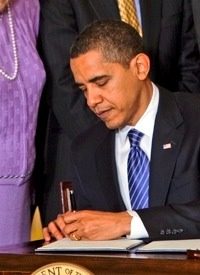
The lead of the New York Times story February 13 proclaims: “With much of his legislative agenda stalled in Congress, President Obama and his team are preparing an array of actions using his executive power to advance energy, environmental, fiscal and other domestic policy priorities.” But constitutionalists ask, what “executive power” to make law?
The role of the President under the U.S. Constitution is not to make laws, but simply to execute the laws passed by Congress. Article I, Section 1 of the U.S. Constitution begins: “All legislative powers herein granted shall be vested in a Congress of the United States.” If the Constitution mandates that “all” law-making powers reside in the Congress, then it stands to reason none is left for the President. The President’s job is that “he shall take care that the laws be faithfully executed” under Article II, Section 3 of the U.S. Constitution.
But the Constitution’s explicit prohibition on executive branch law-making hasn’t stopped a White House frustrated by a Congress that has neglected to pass most of the White House legislative agenda over the past year. “We are reviewing a list of presidential executive orders and directives to get the job done across a front of issues,” White House chief of staff Rahm Emanuel told the New York Times. Likewise, White House communications director Dan Pfeiffer is signaling that the White House plans to ignore the constitutional process over the next year and pursue a more dictatorial course. “The challenges we had to address in 2009 ensured that the center of action would be in Congress,” Pfeiffer told the Times. “In 2010, executive actions will also play a key role in advancing the agenda.”
This new extra-constitutional power of creating law by imperial decree has tremendous support from the leftist New York Times, which agreed that “Any president has vast authority to influence policy even without legislation, through executive orders, agency rule-making and administrative fiat.” This support contrasted greatly from the Times’ heavy — and appropriate— criticism of the Bush-era dictatorial fiats.
The Times stressed that the Clinton and George W. Bush administrations set the precedents where this undefined dictatorial power was exercised, such as “Mr. Bush’s expansive assertions of executive authority, like the secret program of wiretapping without warrants.”
The White House goal is to make Congress irrelevant by circumventing the Constitution. The practical effect of this trend is that America will increasingly have an elective dictatorship if citizens don’t insist upon a return to a strict adherence to the U.S. Constitution.
Photo: AP Images



